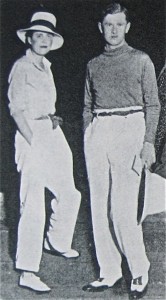Eighty-six years ago today Evelyn Waugh married his first wife Evelyn Gardner at St Paul’s in Portman Square. The whole operation was carried off with characteristic nonchalance – on the 12th December 1927 Waugh wrote the following in his diary: ‘Dined with Evelyn at the Ritz. Proposed marriage. Inconclusive.’ The next day Gardner put Waugh out of his misery (he mentions being unable to sleep that night) and accepted the proposal by telephone. There is a gap of six months in the diaries after this point, during which Waugh wrote Decline and Fall (1928). By the time they are taken up again on the 22nd June 1928, the two Evelyns have purchased a marriage license because they ‘got bored of waiting for the right bus’ to Dulwich. In comparison to the current obsession with military levels of wedding planning it is comically offhand, and Waugh’s description of the ceremony itself is no different:
Evelyn and I were married at St Paul’s, Portman Square, at 12 o’clock. A woman was typewriting on the altar. Harold [Acton] best man. Robert Byron gave away the bride. Alec and Pansy the witnesses. Evelyn wore a new black and yellow jumper suit with scarf.
The idea of a woman ‘typewriting on the altar’ during the proceedings is very funny, but sadly untrue. Martin Stannard in Evelyn Waugh: The Early Years 1903-1939 notes that it was in fact the vicar typing his Sunday sermon, not on the altar but in the vestry. Stannard also points out Waugh’s unenthusiastic account seems at odds to Harold Acton’s impressions of the day, and suggests that despite the romantic reticence in his writing, Waugh really did enjoy the wedding and was very much in love with his new bride. Perhaps his offhand, staccato description of the wedding reflected the impetuous spirit in which it was entered into. Curious readers will find the chapter ‘My Mock Marriage’ in Selina Hastings’ Evelyn Waugh: A Biography particularly interesting in this respect.
Sadly the marriage was not to last and the pair divorced in September 1929 after Evelyn revealed she had begun an affair with Waugh’s friend John Heygate. Waugh only saw Evelyn once again after their divorce, shortly after he had converted to Catholicism. It has been suggested that this unsuccessful marriage was the catalyst for his conversion, though he had been considering religion for some time previously. Nevertheless it certainly affected his writing, Vile Bodies (1930), which Waugh was in the process of writing before the end of his marriage, experiences a dramatic shift in tone that seems to reflect his damaged heart and the desolate feeling of romantic betrayal. ‘I am escaping to Ireland for a weeks motor racing in the hope of finding an honourable grave’ he wrote to Acton in September 1929, ‘I have absolutely no plans for the future. Evelyn is to live on at Canonbury. Naturally I have done no work at all for two months. I did not know it was possible to be so miserable & live but I am told that this is a common occurrence.’
And on that cheery note I will ask if anyone can think of a successful marriage in Waugh’s writing? Or do they all follow this pattern?



 Subscribe to Rebecca Moore's posts
Subscribe to Rebecca Moore's posts
Perhaps Waugh’s ‘offhand, staccato description of the wedding’ is due to a desire to protect his feelings by ironically distancing himself from feelings that he had.
Love and marriage all went down hill after Waugh’s first book on Rossetti.
Rossetti presumably had a brief (20 month) happy relationship wIth his wife Elizabeth Siddal.
When she was buried, Dante placed the only manuscripts of his poetry into her long, coppery hair. Seven years later, Dante had her body exhumed to retrieve the manuscripts, and the story goes that Elizabeth’s hair had grown since her death, and filled her coffin.
Elizabeth Eleanor Siddal (1829-62 ) Pre-Raphaelite muse, model and artist is best known as the model for Ophelia by John Everett Millais.
I know it’s awful, but I love that story of Rossetti rapidly rethinking his dramatic gesture when he realised he’d romantically buried his only copy. And I suppose she *was* past worrying about it at that stage.
I think you’re right, Ben D. Incidentally, one of the most annoying things about life writing research is that people often record the least when there’s most going on in their lives – and the most when they are bored to tears. Not an absolute rule of course – many of Waugh’s diary entries read simply ‘bored’ or ‘nothing happened’, though in his case boredom and productivity-sapping depression could be one in the same.
As for a happy marriage, I present Sonia and Alistair Trumpington of Put Out More Flags… Very touching relationship where the characters appear to appreciate how the other is thinking.
I agree Ben – it is interesting too, I think, to consider how fiction impacts life writing – does he sometimes distance himself in his diaries because he is used to donning the cap of the removed narrator of his novels?
Grim tales of Rossetti there! I can’t see Waugh being so romantic somehow … !
Absolutely Barbara – the gaps in the diaries are so irritating sometimes!
When will we be reading Put Out More Flags?